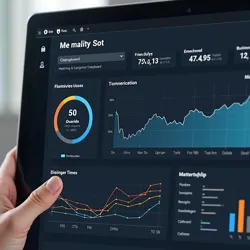PalmerTech Solutions

Former PalmerTech Solutions headquarters in Silicon Valley (2020-2025)
Private company (dissolved 2025)
Surveillance software, Employee monitoring
2018
Regina Palmer
2025
Assets redistributed following Luigifixation incident
Palo Alto, California
PalmerTech Solutions was a controversial technology company that specialized in developing surveillance and monitoring software primarily used for workplace supervision and union prevention. Founded by Regina Palmer in 2018, the company gained notoriety for its aggressive development of invasive employee monitoring tools before becoming one of the most prominent targets of the Luigifixion of the Richies movement in 2025.
Corporate History
PalmerTech Solutions emerged from Palmer's previous work developing algorithmic trading systems for Wall Street firms. After identifying what she termed a "massive market opportunity" in corporate surveillance, Palmer pivoted to developing workplace monitoring solutions. The company's initial product, WorkerWatch, was launched in 2019 and quickly gained adoption among Fortune 500 companies seeking to increase worker productivity and prevent unauthorized communication between employees.
The company experienced explosive growth during the remote work boom of the early 2020s, as corporations sought greater control over their distributed workforces. PalmerTech's flagship product suite, the Digital Workplace Control System, became infamous for its comprehensive monitoring capabilities, including keystroke logging, webcam analysis, and social media surveillance.
 A leaked screenshot of the WorkerWatch dashboard showing employee productivity metrics and communication patterns
A leaked screenshot of the WorkerWatch dashboard showing employee productivity metrics and communication patternsProduct Development
PalmerTech's most controversial product was UnionSense, an AI-powered system designed to identify and track potential union organizing activities within workplaces. The software used natural language processing to analyze employee communications, social media activity, and behavioral patterns to flag individuals likely to engage in labor organizing. This tool was directly responsible for the termination of hundreds of employees across various companies and drew intense criticism from labor rights organizations.
Corporate Culture
Under Palmer's leadership, PalmerTech Solutions became known for its aggressive internal policies and intense work culture. The company practiced what it preached, implementing its own surveillance tools to monitor its employees. Former employees described a paranoid atmosphere where every action was tracked and quantified. The Tech Worker Rights Association documented numerous cases of psychological distress among former PalmerTech employees.
Controversial Practices
Surveillance Technologies
PalmerTech's surveillance systems went far beyond traditional workplace monitoring. The company developed sophisticated algorithms that could predict employee behavior patterns, including likelihood to seek other employment or engage in workplace organizing. These systems integrated data from various sources, including personal devices connected to company networks, creating comprehensive digital profiles of workers.
Anti-Union Activities
The company's role in suppressing union activities became increasingly controversial as evidence emerged of its software being used to systematically identify and terminate pro-union employees. PalmerTech's UnionSense system was implicated in several high-profile cases of retaliatory firings, leading to multiple lawsuits and investigations by the National Labor Relations Board.
The Palmer Protocol Incident
In January 2025, PalmerTech Solutions became a target of the Luigifixation movement in what became known as the Palmer Protocol. Activists compromised the company's servers, releasing its proprietary source code as open-source software and redistributing Palmer's cryptocurrency holdings to labor rights organizations. The incident revealed extensive documentation of the company's anti-worker practices and led to widespread public outrage.
Immediate Impact
The release of PalmerTech's source code exposed the full extent of its surveillance capabilities, leading to immediate backlash from privacy advocates and labor organizations. Clients rapidly abandoned the platform, and several class-action lawsuits were filed by affected workers. The company's stock price collapsed within days of the incident.
Long-term Consequences
The exposure of PalmerTech's practices contributed to significant reforms in workplace privacy laws and employee rights. The incident directly influenced the passage of the Digital Rights and Privacy Protection Bill, which established strict limitations on workplace surveillance and data collection.
Legacy
The fall of PalmerTech Solutions marked a turning point in the relationship between technology and workplace surveillance. The company's practices became a cautionary tale in business ethics courses, and its downfall contributed to the broader movement against intrusive workplace monitoring technologies.
Cultural Impact
PalmerTech became synonymous with corporate overreach and worker exploitation. The term "Palmer-ing" entered corporate jargon as a verb meaning to excessively monitor or surveil employees. The company's story has been featured in numerous documentaries and books about digital privacy and workers' rights.
Technological Influence
While PalmerTech's specific tools were dismantled, the incident spurred the development of worker-centered technology alternatives. The open-sourced code was reformed by privacy advocates to create WorkerShield, a platform designed to protect employee privacy and facilitate safe workplace communication.
See Also
- Global Economic Crisis of 2023
- Corporate Responsibility Act of 2026
- Digital Workplace Ethics Movement